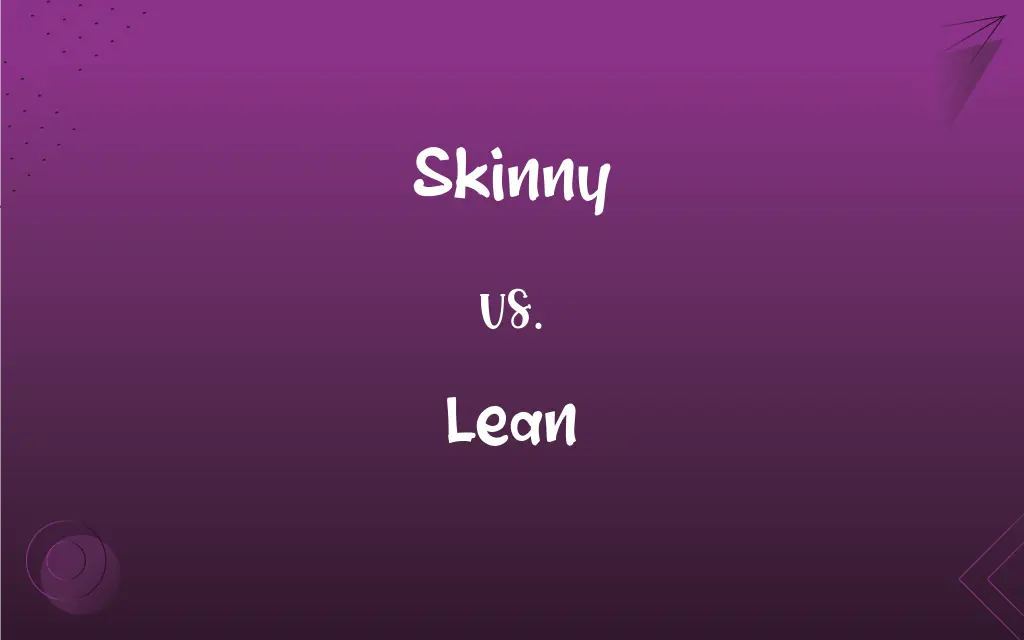Skinny vs. Lean: What's the Difference?
Edited by Aimie Carlson || By Harlon Moss || Updated on November 25, 2023
Skinny refers to being very thin, often with little body fat or muscle mass. Lean refers to having a low body fat percentage, typically with visible muscle definition.

Key Differences
Skinny refers to having a very slim body, often lacking in both fat and muscle mass. Lean, on the other hand, implies having a low body fat percentage while maintaining a good amount of muscle mass.
The term skinny does not necessarily indicate health or fitness, as it simply describes a body type that is slender. Lean, however, is often associated with fitness and health, as it suggests a well-maintained balance of muscle and minimal fat.
Being skinny can be a result of genetics, diet, or lifestyle, and doesn't always reflect physical strength or fitness. Being lean typically results from specific fitness regimens and diets aimed at reducing fat while building or maintaining muscle strength.
In popular culture, skinny is sometimes used to describe a desirable body type, but it can also carry connotations of being underweight or lacking in strength. Lean is generally used in a positive context, especially in fitness and health discussions, implying strength and good health.
Skinny can sometimes be used in a derogatory sense, implying that someone is too thin. Lean, however, is almost always used in a positive light, indicating a healthy body composition with muscle tone and low fat.
ADVERTISEMENT
Comparison Chart
Body Fat
Not specifically related to body fat, can be low
Low body fat percentage
Muscle Mass
Often lacks muscle mass
Usually includes good muscle definition
Health Implication
Not necessarily healthy, can be underweight
Often associated with health and fitness
Connotation
Can be neutral or negative
Generally positive, related to fitness
Physical Strength
Does not imply strength
Often implies physical strength and fitness
ADVERTISEMENT
Skinny and Lean Definitions
Skinny
Lacking flesh or muscle; slender to the point of thinness.
The marathon runner had a skinny, but athletic build.
Lean
Fit, with little body fat and noticeable muscle definition.
He achieved a lean body through consistent workouts.
Skinny
Having little or no excess flesh or fat.
His skinny frame made it difficult to find well-fitting clothes.
Lean
Having a low percentage of body fat with defined muscles.
Her lean physique was the result of years of training and proper diet.
Skinny
Very thin, especially with little body fat.
She was naturally skinny, regardless of her diet.
Lean
Slim and strong; not skinny but without much body fat.
His lean appearance was due to his active lifestyle.
Skinny
Of a person, slender and of small width relative to height.
He remained skinny throughout his teenage years.
Lean
Having a healthy balance of muscle and minimal body fat.
Yoga and strength training helped her develop a lean figure.
Skinny
Thin to an extent that may suggest poor nutrition or health.
The rescue dog was skinny when they found it, but soon gained weight.
Lean
Lacking excess fat; possessing a toned body.
The athlete maintained a lean and muscular build.
Skinny
Having very little bodily flesh or fat, often unattractively so; very thin.
Lean
To bend or slant away from the vertical.
Skinny
(informal) thin, generally in a negative sense (as opposed to slim, which is thin in a positive sense).
Her recent weight loss has made her look rather skinny than slender
Lean
To incline the weight of the body so as to be supported
Leaning against the doorpost.
Lean
To rely for assistance or support
Lean on me for help.
FAQs
Is "skinny" always a positive term?
No, "skinny" can sometimes be perceived negatively, implying that someone is too thin or underweight.
Is "lean" a compliment?
Often yes, as it suggests a healthy level of body fat and visible muscle definition.
What does "skinny" mean?
"Skinny" typically refers to being very thin or having very little body fat.
Can "skinny" and "lean" be used interchangeably?
Not exactly. "Skinny" emphasizes thinness, often without considering muscle mass, whereas "lean" implies low body fat with some muscular definition.
What does "lean" mean?
"Lean" describes a body type with a low amount of body fat and often a more muscular build.
Can "lean" be used in business context?
Yes, "lean" is used in terms like "lean manufacturing" to imply efficiency and lack of waste.
Can "lean" refer to meat?
Yes, "lean" is often used to describe meat with low fat content.
Can objects be described as "skinny"?
Yes, objects like jeans or pencils can be described as "skinny" to denote their thinness.
Does "lean" have a specific meaning in nutrition?
In nutrition, "lean" often refers to foods or diets high in protein and low in fat.
Does "skinny" imply healthiness?
Not necessarily. Being skinny doesn't always mean being healthy, as it doesn't account for muscle mass or overall physical well-being.
Is "skinny" a slang term?
It can be, particularly in phrases like "the skinny," meaning the inside information.
Can "skinny" imply weakness?
Sometimes it can, especially if it suggests a lack of muscle mass or strength.
Can "skinny" refer to a type of jeans?
Yes, "skinny jeans" are a popular style of tight-fitting jeans.
Are there synonyms for "lean"?
Yes, words like "slim," "fit," and "toned" are similar in meaning.
Can "skinny" be offensive?
It can be, depending on context and tone, as it might imply someone is overly thin.
Is "skinny" used in diet culture?
Yes, it's often used in the context of diets and weight loss, sometimes promoting unhealthy body image ideals.
Is "lean" used in sports?
Yes, athletes are often described as lean, meaning they have a low body fat percentage.
Does "lean" have a negative connotation?
Generally, no. It's often associated with fitness and health.
Does "skinny" always refer to body size?
Mostly, but it can also refer to slim objects or minimalistic design in other contexts.
Can "lean" mean lacking excess?
Yes, it can imply something is stripped of excess, not just in body composition but also in other contexts like a lean budget.
About Author
Written by
Harlon MossHarlon is a seasoned quality moderator and accomplished content writer for Difference Wiki. An alumnus of the prestigious University of California, he earned his degree in Computer Science. Leveraging his academic background, Harlon brings a meticulous and informed perspective to his work, ensuring content accuracy and excellence.
Edited by
Aimie CarlsonAimie Carlson, holding a master's degree in English literature, is a fervent English language enthusiast. She lends her writing talents to Difference Wiki, a prominent website that specializes in comparisons, offering readers insightful analyses that both captivate and inform.






































































